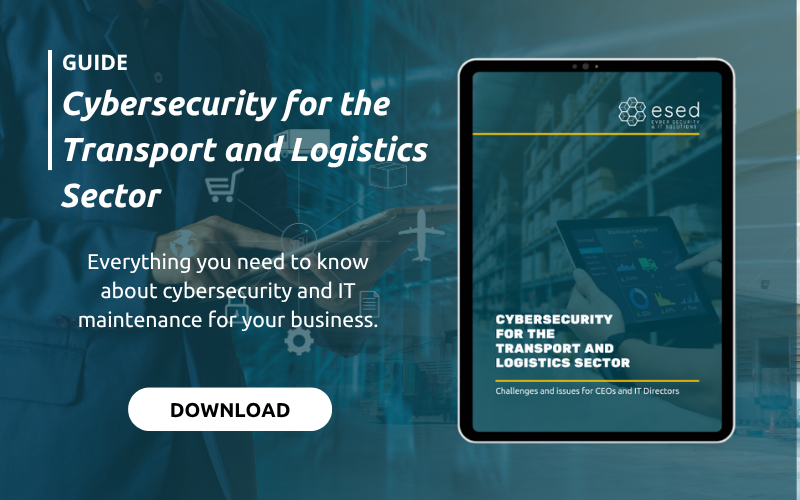Cybersecurity strategies for logistics sector companies
By Eduard Bardají on Nov 5, 2025 9:52:48 AM

Digitalization has transformed logistics into a system of constant interdependence, where operational efficiency is intrinsically linked to data security. With the increasing risks of disruption from threats such as ransomware and supply chain manipulation, cybersecurity can no longer be just an add-on, it must be a strategic pillar.
Building a robust and resilient defense in logistics requires moving away from isolated solutions and adopting a security model that aligns with the company’s real needs, designed to address any system vulnerabilities or breaches. To achieve this, creating a specific cybersecurity strategy is essential.
How to design a strong cybersecurity strategy for the logistics sector: Tips
The logistics environment, characterized by high volatility and interconnected critical systems (WMS, TMS, IoT devices), is a prime target for cyberattacks. A shutdown of operations can have disastrous consequences. Therefore, any strategy must focus on proactive defense and recovery capability.
Essential cybersecurity solutions to protect your company
XDR Technology: Automated Detection and Response
The high volatility of the supply chain requires solutions that offer continuous visibility and automated response capabilities. Traditional signature-based tools have become obsolete when facing sophisticated attacks designed to move laterally across the network.
Implementing XDR or MDR solutions enables real-time monitoring and detection of anomalous behavior.
This technology goes beyond traditional antivirus—it automatically isolates compromised devices and provides full traceability into the origin and scope of any threat or cyberattack.
Security for IoT and operational devices
The rise of IoT devices (sensors, cameras, trackers) expands the attack surface across the sector. A cybersecurity strategy must include network segmentation to isolate these devices, limiting communication to only what is necessary. This ensures that if a sensor is compromised, attackers cannot move laterally to management systems or the central corporate network.
Cyber Resilience
No technology is infallible. A company’s resilience during an attack depends directly on the quality of its recovery processes. In logistics—where continuity is critical—being able to resume operations is just as important as prevention.
Backups and disaster recovery plan
Designing a backup and recovery plan is essential to ensure fast and easy data restoration after a cyberattack. Applying the 3-2-1 Rule (three copies, two different storage media, one isolated and immutable copy) helps guarantee that ransomware cannot encrypt backups as well. Having isolated and tested backups ensures operations can resume without paying ransom, minimizing downtime.
24/7 Monitoring and proactive threat management
Early detection is key to mitigating operational shutdowns. It is essential to implement continuous (24/7) monitoring for critical systems (WMS, TMS, servers). This approach helps identify anomalies before an attack is executed.
Employee Training and Awareness: The First Line of Defense
In an environment where digitalization is integrated into every process, cyberattacks often begin with human error rather than technical failure.
In logistics, where personnel handle sensitive information and critical access, awareness is crucial. Continuous training reduces the likelihood of breaches by teaching employees how to detect phishing attempts and manage access and passwords securely. Attack simulation programs help measure readiness and correct risky behavior. A strong cybersecurity culture reinforces every defense layer, making protection a shared responsibility.
A single failure or breach in your IT infrastructure not only disrupts operations—it can damage customer and partner trust and lead to severe financial loss.
This is why adopting a comprehensive defense that includes advanced technology, secure backups, and employee training is the best way to ensure continuous operations.
Cybersecurity is no longer just protection, it’s a competitive differentiator that ensures your company’s reliability and reputation in a market where speed is vital.
You May Also Like
These Related Stories

Most common cyberattacks in the logistics sector

Real cases of cyberattacks in the Biotech sector






.png?width=262&height=150&name=accio-10-negre%20(1).png)

